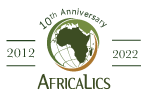By Senior Advisor and AfricaLics PhD VFP academic coordinator, Margrethe Holm Andersen, Department of Politics and Society, Aalborg University, Denmark
As the Covid-19 pandemic and related global health and financial crises are spreading worldwide, I hope you are all doing what is possible to take good care of yourselves, your families, friends and your communities and countries at large.
These are trying times for many and fighting the pandemic will take time. It will also require a lot of collective creativity and collaboration! The situation also calls for new efforts and methods in our attempts to continue research, teaching and research capacity building. In Denmark as in many other countries in the world, the lock-down of schools and universities has sparked off a virtual explosion of activities aimed at digitalizing teaching and research efforts. Lecturers who have never tried recording a lecture before have been publishing their lectures (using Panopto and/or Moodle software) within a few days from the lock-down taking effect. Parents have to support their children in using digital learning methods much more than before the lock-down. Online research meetings, teaching and supervision take place using Micro-soft Teams, Zoom, Skype or Skype for Business or other platforms. And so on.
In short: working from home via digital platforms and thinking about how we can ensure good quality teaching and supervision of students – and stay in touch with colleagues in research and research capacity building – has become the order of the day. A ‘new normal’ is rapidly emerging.
Digital Empirical methods
At Aalborg University, from where I work, one of the main issues right now is that many students are in the process of collecting empirical data for their semester projects or their Masters. We build our education offerings on the philosophy of group based Problem Based Learning – and an essential part of the learning process for the students is to interact with each other. Students also often make face-to-face interviews with key informants from industry, the public sector and civil society to shed light on the problems with which they are working. In the current situation, where face-to-face interviews and group work are not possible, there is a dire need to look for alternatives! Fortunately, there are many digital options and articles about the benefits and pitfalls related to the use of these available.
Below is a small set of methods which the ‘digital taskforces’ at the Department of Business and Management at Aalborg University has recommended for sharing with students. Obviously, supervisors are also encouraged to familiarize themselves with the material in order to help the students finish their projects in a good and academically solid way!
Some suggestions:
- Adam Jowett, Associate Head, School of Psychological Social & Behavioural Sciences at Coventry University has published a useful list on Twitter: https://twitter.com/DrAdamJowett
- This book provides excellent guides on methods of data collection that don’t require face-to-face interaction: Braun, V., Clarke, V., & Gray, D. (Eds.). (2017). Collecting qualitative data: A practical guide to textual, media and virtual techniques. Cambridge University Press (available through AUB)
- Conducting interviews via Skype (or Zoom, FaceTime etc) Lo Iacono, V., Symonds, P., & Brown, D. H. (2016). Skype as a tool for qualitative research interviews. Sociological Research Online, 21(2), 1-15. https://repository.cardiffmet.ac.uk/…/Skype%20as%20a%20Tool…
- Analysing media representations e.g. Jowett, A., & Peel, E. (2010). Seismic Cultural Change?”: British media representations of same-sex ‘marriage. In Women’s Studies International Forum, 33(3), 206-214 https://curve.coventry.ac.uk/…/745eefdb-9e…/1/jowettcomb.pdf
- Instant messaging interviews: Jowett, A., Peel, E., & Shaw, R. (2011). Online interviewing in psychology: Reflections on the process. Qualitative Research in Psychology, 8(4), 354-369
- Analysing online forums: Jowett, A. (2015). A case for using online discussion forums in critical psychological research. Qualitative Research in Psychology, 12(3), 287-297. https://curve.coventry.ac.uk/…/Using%20online%20forums%20in…
- Online vignette studies: Gray, D., Malson, H., & Royall, B. (2017). Hypothetically speaking: Using vignettes as a stand-alone qualitative method. https://uwe-repository.worktribe.com/…/IQR%20Vignettes_V3%2…
- Designing and Conduction Research With Online Interviews https://pdfs.semanticscholar.org/e432/663af2dc4dc05f76a143dc4c92d044503ffc.pdf
- Online Interviews in Real Time https://books.google.dk/books?hl=da&lr=&id=iDzGvoekyekC&oi=fnd&pg=PR1&dq=janet%20salmons&ots=SalgX71g5x&sig=BsRl7KPczX2XacIf-oZwLSFh2jo&redir_esc=y#v=onepage&q=janet%20salmons&f=false
- Literature on qualitative methods for online data production: https://www.dropbox.com/scl/fi/1knkpxcisrv1dbndjpst0/Litteraturliste_-Kvalitative-metoder-til-online-dataproduktion.paper?dl=0&rlkey=ej85gsug0aanu3p4yri34fotp
You may also want to visit: https://docs.google.com/document/d/1clGjGABB2h2qbduTgfqribHmog9B6P0NvMgVuiHZCl8/mobilebasic –
This crowdsourced document initiated by Deborah Lupton (@DALupton, d.lupton@unsw.edu.au) on 17 March 2020 includes a load of ideas for doing fieldwork in a pandemic….
You may already know some (or many) of the methods listed or referred to above. Even so, and although the methods do not focus on Innovation and Development studies research as such, I hope you will find inspiration from the various sources. They also provide a means to go beyond the standard ways of working that we tend to see reflected in some of the papers submitted for e.g. AfricaLics and Globelics conferences or academies. It will be interesting to hear from some of you on whether you find any of these methods useful – and not least to hear whether and how you end up applying them to studies of Innovation and Development issues in an African context, what challenges you may experience and what lessons you gather.
I am quite sure that many of the methods will be useful – not just now, but also on the ‘other side’ of the pandemic. I also think we can expect profound changes in teaching, research and research capacity building resulting from this wild, ongoing disruption of our everyday lives and ways of working! To paraphrase an old Chinese proverb: We live in interesting times!
Stay safe!
Best,
Margrethe
Twitter: @holm_ander
Mail: mhand@dps.aau.dk
AAU-profile: https://vbn.aau.dk/en/persons/104829
